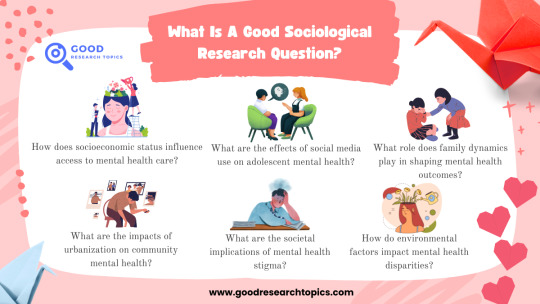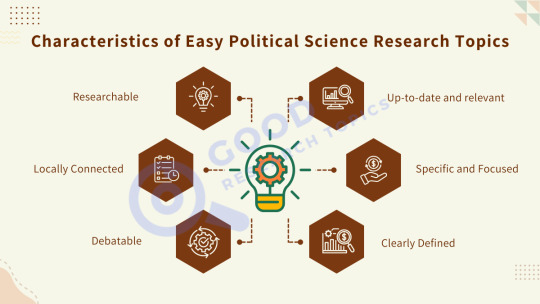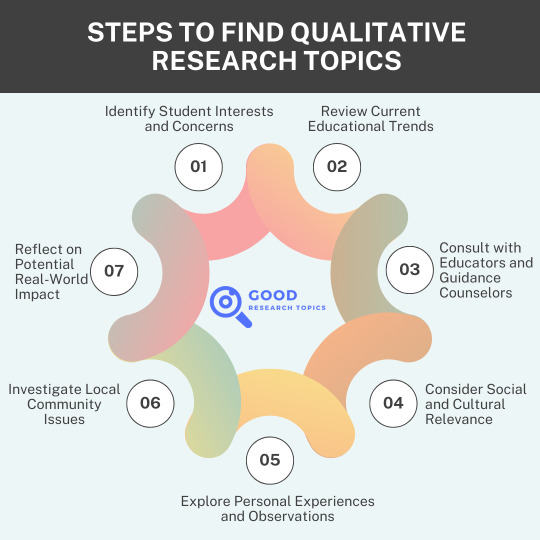Text

What Is A Good Sociological Research Question?
0 notes
Text
What is a good sociological research question?
A good sociological research question should be clear, focused, and relevant to current social issues or phenomena. It should also be answerable through empirical investigation and capable of generating new insights or understanding. Here are a few examples across different sociological domains:
Education: "How does the socioeconomic background of parents influence the academic achievement of their children in urban public schools?"
Gender Studies: "What are the factors contributing to the persistent gender wage gap in STEM professions?"
Family & Marriage: "How do cultural and societal norms shape the division of household labor among heterosexual couples in dual-income households?"
Health & Healthcare: "What are the social determinants influencing disparities in access to mental health services among minority populations?"
Crime & Deviance: "What are the social factors contributing to the prevalence of juvenile delinquency in urban neighborhoods?"
Globalization & Immigration: "How does the process of globalization influence cultural identity formation among second-generation immigrants?"
Media & Technology: "What are the effects of social media usage on mental health outcomes among adolescents?"
Environmental Sociology: "How do social inequalities intersect with environmental justice issues in disadvantaged communities?"
These examples cover a range of sociological topics and illustrate the kinds of questions researchers might explore within each domain. It's important for the researcher to consider the feasibility of investigating the question, the availability of data, and the potential ethical implications of the research.
0 notes
Text
https://goodresearchtopics.com/sociology-research-topics-on-mental-health/
0 notes
Text
How reliable is Google Scholar?
Google Scholar is a widely used and valuable tool for academic research, but like any database, it has its strengths and limitations. Understanding its reliability requires consideration of several factors:
Comprehensiveness: Google Scholar's vast database covers a wide range of academic disciplines and sources, including peer-reviewed papers, theses, books, conference proceedings, and preprints. This breadth can be advantageous for interdisciplinary research but may also lead to occasional inclusion of non-peer-reviewed or lower-quality sources.
Citation Metrics: Google Scholar calculates citation metrics such as the h-index and i10-index based on its database. While these metrics provide insights into an author's impact and productivity, they may not always accurately reflect scholarly influence, as they can be influenced by self-citations, variations in citation practices across disciplines, and other factors.
Accessibility: Google Scholar's user-friendly interface and free access make it widely accessible to researchers, students, and the general public. However, this accessibility means that not all content in Google Scholar is peer-reviewed or of equal scholarly rigor. Users should critically evaluate the sources they find, considering factors such as author credibility, publication venue, and peer review status.
Search Algorithm: Google Scholar's search algorithm prioritizes relevance and citation count, which can be beneficial for finding influential works but may also lead to some bias toward older, highly cited papers. Users should employ advanced search features and Boolean operators to refine their searches and retrieve more precise results.
Coverage and Updates: Google Scholar continuously crawls the web to index new content, but it may not capture every scholarly publication or update immediately. Some disciplines or languages may also be underrepresented in Google Scholar's database. Researchers should complement their searches with other databases and resources to ensure comprehensive coverage.
Overall, Google Scholar is a valuable tool for academic research, but users should approach it with a critical eye, carefully evaluating the relevance, quality, and reliability of the sources they find. It is most effective when used in conjunction with other scholarly databases and resources to ensure thorough and rigorous research.
0 notes
Text
What are some topics for ICMR UG research?
Sure, here are some topics suitable for ICMR undergraduate research:

Impact of COVID-19 on mental health in college students.
Analysis of factors contributing to vaccine hesitancy.
Comparative study of treatment options for type 2 diabetes.
Evaluation of telemedicine effectiveness in rural areas.
Study of genetic factors contributing to cancer.
Role of community health workers in maternal care.
Assessment of nutritional interventions for pregnant women.
Epidemiology of antibiotic resistance in hospital settings.
Evaluation of interventions to reduce stigma around mental illness.
Impact of air pollution on respiratory health.
Study of waterborne diseases in urban communities.
Comparative analysis of nutritional supplements for malnourished children.
Role of school-based health education programs in preventing substance abuse.
Assessment of healthcare access among marginalized populations.
Epidemiology of emerging infectious diseases.
Evaluation of interventions to promote healthy lifestyle habits in adolescents.
Role of community health workers in promoting HIV testing and treatment.
Comparative analysis of treatment options for substance use disorders.
Study of risk factors for cardiovascular diseases among young adults.
Assessment of the impact of climate change on vector-borne diseases.
0 notes
Text
0 notes
Text
What are the pros and cons of Filipino psychology?
We're exploring the benefits and drawbacks of Filipino psychology in simple terms, focusing on its insights into Filipino culture and its potential biases and limitations.
Advantages of Filipino Psychology:
Offers insights into Filipino culture: Helps understand the unique behaviors and beliefs of Filipinos.
Promotes understanding of different cultures: Encourages respect for other cultures, leading to more inclusive practices.
Customizes treatments for Filipinos: Allows for making treatments that match Filipino people better, making them more effective.
Addresses social problems: Focuses on fairness and helping people, dealing with issues like poverty and human rights.
Strengthens cultural pride: Boosts pride in Filipino culture by showing respect for Filipino traditions.
Disadvantages of Filipino Psychology:
Risk of unfair judgments: There's a chance of making stereotypes about Filipino behaviors, which can lead to unfair treatment.
Limited usefulness in other cultures: Sometimes what we learn about Filipinos doesn't apply to other cultures, so it might not be helpful elsewhere.
Not enough resources: Without enough money and tools, it's hard to make progress in Filipino psychology.
Past influences: The past may have left ideas that affect Filipino psychology, making it hard to change some beliefs.
Resistance to change: Some people might not want to try new ways of thinking because they prefer older methods.
0 notes
Text
Easy Political Science Research Topics

The Impact of Social Media on Political Campaigns
Climate Change Policies and Government Responses
The Influence of COVID-19 on Global Politics
Gender Equality in Political Leadership Roles
Voter Participation and Engagement Strategies
Understanding Populist Movements in Modern Politics
Political Polarization: Causes and Consequences
Immigration Policies and Their Social Implications
The Role of Lobbying in Shaping Government Policies
Environmental Protection and Political Action
Surveillance and Privacy Rights in the Digital Age
The Effectiveness of Non-Governmental Organizations (NGOs) in Advocacy
Electoral Reforms for Enhancing Democratic Processes
International Trade Agreements and Their Impacts
Healthcare Policies and Access to Services
Youth Political Participation and Civic Engagement
Economic Inequality and Its Effects on Politics
Media Influence on Public Opinion and Perception
Fighting Political Corruption: Strategies and Challenges
Human Rights Violations and International Responses
#research#Easy Political Science Research Topics#political#political science#education#research paper
0 notes
Text
What topic related to STEM would be good to research on?
There are numerous fascinating topics related to STEM (Science, Technology, Engineering, and Mathematics) that would be excellent for research. Here are a few suggestions:
Renewable Energy: Investigate the efficiency of different renewable energy sources like solar, wind, or hydroelectric power generation.
Climate Change: Research the impacts of climate change on ecosystems, weather patterns, or sea levels, and explore potential mitigation strategies.
Biotechnology: Study genetic engineering techniques like CRISPR/Cas9 and their applications in agriculture, medicine, or environmental conservation.
Artificial Intelligence: Explore machine learning algorithms and their applications in areas such as healthcare diagnostics, autonomous vehicles, or natural language processing.
Space Exploration: Investigate topics related to space exploration, such as planetary science, space habitats, or the search for extraterrestrial life.
Health Sciences: Research topics related to public health, disease prevention, epidemiology, or medical innovations like prosthetics or drug delivery systems.
Environmental Science: Study topics such as pollution monitoring, biodiversity conservation, sustainable resource management, or ecological restoration.
Robotics: Explore advancements in robotics technology, including topics like human-robot interaction, swarm robotics, or robotic surgery.
Data Science: Investigate big data analytics, data visualization techniques, or predictive modeling in fields like finance, healthcare, or social media.
STEM Education: Research effective teaching methods, curriculum development, or educational technologies to improve STEM learning outcomes for students.
These are just a few examples, and there are countless other intriguing topics within the STEM fields waiting to be explored through research. It's essential to choose a topic that aligns with your interests, skills, and the resources available for your research project.
0 notes
Text
What are some best qualitative research topics for a senior high school student who is a beginner in research, like me?
Here are some beginner-friendly qualitative research topics for a senior high school student:

The Impact of Social Media on Teenagers' Self-Esteem
Teenage Perspectives on Body Image and Beauty Standards
Coping Strategies for Managing Stress Among High School Students
Experiences and Perceptions of Bullying in High Schools
The Role of Extracurricular Activities in Student Well-being
Parental Influence on Academic Motivation and Achievement
Peer Relationships and Social Dynamics in High School
Teenagers' Views on Mental Health Awareness and Support
Understanding Diversity and Inclusion in High School Settings
Student Perspectives on School Safety Measures
These topics are straightforward and provide ample room for exploration and learning as a beginner in research. Feel free to choose one that interests you the most!
1 note
·
View note
Text
Best Sociology Research Topics for College Students
Sociology, as a discipline, offers college students a unique opportunity to explore the intricacies of human society and understand the underlying dynamics that shape our world. Through research, students can delve into a wide range of sociological topics, gaining insights into social inequalities, cultural dynamics, and collective behaviors. In this article, we will explore various sociology research topics tailored for college students, highlighting their relevance, significance, and potential for promoting social change.
The Role of Sociology in Understanding Society:
Sociology serves as a lens through which we can examine social structures, interactions, and institutions. By employing empirical research methods and theoretical frameworks, sociology enables students to analyze complex societal phenomena and gain a deeper understanding of the forces shaping human behavior and relationships.
Exploring Social Inequalities and Social Justice:
One of the central focuses of sociology research is the exploration of social inequalities and injustices. Topics in this area encompass a wide range of issues, including racial discrimination, gender inequality, economic disparities, and access to education and healthcare. By investigating these inequalities, college students can raise awareness, advocate for social justice, and work towards creating a more equitable society.
Understanding Cultural Diversity and Identity:
Cultural sociology examines the diversity of human cultures and the ways in which cultural beliefs, values, and practices shape individual and collective identities. Research topics may include cultural globalization, multiculturalism, cultural appropriation, and the preservation of indigenous cultures. By studying cultural diversity, students can foster greater appreciation and understanding of different cultural perspectives and promote intercultural dialogue and understanding.
Analyzing Social Institutions and Power Structures:
Social institutions, such as family, education, religion, and government, play a significant role in shaping social norms and power dynamics. Research topics in this area may include the impact of family structures on socialization, the role of education in social mobility, religious influences on political ideologies, and the distribution of power and resources within society. By analyzing social institutions, students can gain insight into the mechanisms of social control and work towards challenging oppressive structures and promoting social change.
0 notes
Text
Unveiling the Fascinating World of Qualitative Research in STEM: Inspiring Topics for Students
Embarking on the journey of qualitative research can be a thrilling experience for STEM students, offering a unique lens through which to explore and understand the complexities of scientific phenomena. In this blog post, we delve into some of the most intriguing qualitative research topics that promise to captivate the curious minds of STEM students.
Qualitative research in STEM goes beyond the conventional boundaries of quantitative analysis, inviting students to immerse themselves in the richness of real-world experiences, narratives, and perspectives. One compelling avenue is the exploration of interdisciplinary connections, where scientific disciplines converge to unravel new insights. Whether it's the intersection of biology and engineering or the symbiosis of physics and environmental science, these interdisciplinary studies pave the way for groundbreaking discoveries.
For those fascinated by the human element in science, topics like the social impact of technological advancements or the ethics of genetic engineering open doors to thought-provoking discussions. Understanding how scientific progress intersects with societal values and ethical considerations adds depth to the research experience.
As students navigate the realm of qualitative research in STEM, they not only enhance their analytical skills but also foster a holistic understanding of the scientific landscape. From uncovering untold stories in data to addressing ethical dilemmas, these topics empower students to be not just scientists but conscientious contributors to the ever-evolving world of STEM.
0 notes
Text
What are the current research topics or PhD proposals for commerce students?
Here are some broad areas for commerce-related research:
Digital Transformation in Business:
Impact of emerging technologies (e.g., blockchain, AI) on business processes.
E-commerce trends and consumer behavior in the digital era.
Sustainable Business Practices:
Corporate social responsibility and its influence on brand perception.
Strategies for implementing sustainable supply chain management.
Financial Markets and Investments:
Analysis of risk management strategies in financial markets.
Behavioral finance and decision-making in investment.
Entrepreneurship and Innovation:
Factors influencing successful entrepreneurship in the modern economy.
Innovation management in startups and established businesses.
International Business and Trade:
Impact of trade agreements on global commerce.
Cross-cultural management strategies for multinational corporations.
Marketing and Consumer Behavior:
Personalization in marketing and its effects on consumer engagement.
The psychology of pricing and its impact on consumer decision-making.
Management and Leadership:
Leadership styles and their impact on organizational culture.
Change management strategies in the face of economic uncertainties.
Human Resources and Workplace Dynamics:
Strategies for talent acquisition and retention in competitive industries.
Workplace diversity and its influence on organizational performance.
Financial Technology (FinTech):
Adoption and impact of FinTech innovations on traditional banking.
Cryptocurrency and its implications for financial markets.
Health Economics in Business:
Economic aspects of healthcare policies and their impact on businesses.
The role of businesses in promoting employee health and well-being.
0 notes
Text
What are some good life sciences journals which publish research papers free of cost?
There are several reputable life sciences journals that offer free access to research papers. Here are a few examples:
PLOS Biology - PLOS (Public Library of Science) publishes high-quality research across all areas of biology. They operate under an open-access model, making all articles freely available to the public.
BMC Biology - BMC (BioMed Central) Biology publishes research articles across all areas of biology and welcomes submissions from all disciplines. They offer immediate open access to all articles.
PeerJ - PeerJ is an open-access journal that publishes research in biological and medical sciences. Authors can choose between different publication plans, including a free plan for those who are unable to cover the publication fee.
Frontiers in Life Science - Frontiers is a community-driven open-access publisher and research networking platform. They cover a wide range of life science disciplines and offer free access to articles.
eLife - eLife is a nonprofit organization that publishes research in the life and biomedical sciences. They offer immediate open access to all articles and operate under a fair and transparent peer-review process.
F1000Research - F1000Research is an open-access publishing platform for life scientists. Authors can publish their research rapidly, and all articles undergo transparent peer review.
Wellcome Open Research - Wellcome Open Research is a platform for publishing research funded by the Wellcome Trust. It covers a broad range of life sciences topics and provides free access to all articles.
These journals are known for their commitment to open access and high standards of peer review. However, it's always a good idea to verify the reputation and impact factor of any journal before submitting your work.
1 note
·
View note